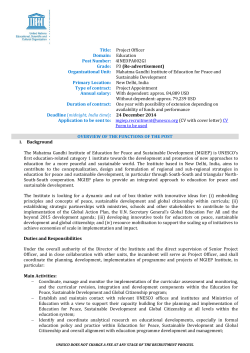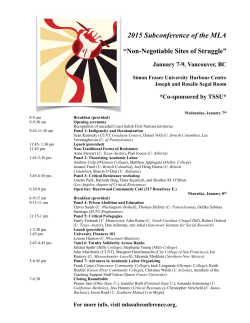
YFactor: where is [y]our future?
YFactor: where is [y]our future? Putting youth on the EU agenda Brussels, 5 February 2015 (Draft Programme) Background In the wake of the new EU legislature in the Council, Parliament and Commission, 2015 provides an especially unique opportunity to discuss future challenges regarding EU policies from the perspective of young EU citizens. Whilst EU leaders from the Parliament and the Council have invoked their own thoughts on the vision for Europe during the next five years, the new President of the European Commission, Jean-Claude Juncker's recent 10 points agenda is perhaps the most operational tool to drive change within the EU's cities and regions. This conference is an opportunity to present the new President of the European Commission with a number of proposals related to the most salient and decisive issues for the young Europeans: lack of jobs and concerns about "Youth [Un]employment"; youth's disinterest in the EU politics and the polarisation of the EU citizenship; as well as young people's concerns about environmental degradation and short-term policies, in relation to the need for Sustainable development and growth. These proposals will be drafted and voted upon by the attendees of the conference and a member of the European Commission will be invited to attend the conference to respond to the demands and proposals of the youth representatives. The conference will be a one-day event, taking place at the Committee of the Regions at the beginning of February. The speakers participating at this conference will include high-level representatives from European institutions, academia and civil society. Target group and communication The main target audience will include students, young leaders, CoR members, decision makers from the EU institutions and representatives of activist groups. Thus, the intention is to invite participants of varying ages within the identified groups to engage and provide one another with knowledge regarding the main concerns of Europe's youth. In order to be able to hear the voices of all young people around Europe, a social media campaign will be launched, engaging youth all over Europe to comment on the subthemes through a range of social media channels including Facebook and Twitter with the aid of visual stimulus such as pictures, videos and infographics. We will target civil society and youth representatives in Member States and use a hashtag campaign to help build interest around the specific topic, addressing different elements within the sub-themes along the course of the run-up to the conference. This campaign would also allow participants unable to attend the conference to send in their contributions for discussion in advance. We would seek the expertise from certain organisations such as Debating Europe, which has an established online platform through which to discuss topics of interest within the European Union and which brings together a range of interested stakeholders on the subject. The conference would also be web streamed so that those unable to attend the event in Brussels would have the alternative to follow the conference online and to engage in an online discussion. Organisation team The conference will be organised by the CoR trainees with the help and guidance by the Communication and Events Directorate of the CoR and will also present itself as an opportunity for the trainees to demonstrate their professional capabilities and some of what they have learnt during their traineeship. Draft programme Thursday 5 February 2015 (date tbc) Jacques Delors Building, rue Belliard/Belliardstraat 99-101, Brussels 09:30-10:15: Opening Session The opening session will set the whole conference in context by discussing the need for young people's concerns to be better addressed by the Commission's agenda. The Opening session's main aim will be to set forth the three conference sub-themes (Youth [Un]employment, European Citizenship and Sustainable Development and Growth), but also to set a dynamic and spirited momentum. Participants and panellists alike should be thrilled to be participating in a conference that aspires to provoke conversation, thought and tangible feedback and what can be done to improve the involvement of European youth in its continent. This morning session will also help establish structure for the remainder of the day and trigger initial food for thought on these topics alike. 10:15-12:30: Parallel Panel Sessions Panel Session 1: Youth [Un]Employment The Youth [Un]Employment panel is designed to create an open dialogue between youth, policy makers and EU officials to exchange the challenges facing the youth, particularly in the realm of professional aspirations. Topics may include constricting entry-level positions, the costs of career and more. Overall, the workshop aims to bridge individuals from a variety of fields in an effort to create a productive and thoughtprovoking environment for the discussion of youth [un]employment. Guiding questions for debate: 1. Vicious internship cycle: How can we get out of this professional pattern faced by many young people entering the working world? 2. What are the needs for the NEETs? What needs to be done for young people that are not in employment, education or training? 3. Filling the gaps in the labour market: towards a common European approach to Youth? What works well? What needs to be changed? How can youth contribute to this? Can policies such as common European unemployment insurance or a Universal Basic Income for young people be envisaged? Panel Session 2: Is the European Citizenship failing the youth? According to the Treaty on the Functioning of the European Union, EU citizenship is additional to and does not replace national citizenship. Hence, every EU citizen has the right and the obligation to participate in EU aspects. However, the small percentage of young voters in the last EU elections raises questions about the reasons that lie behind their disinterest in EU politics. There is also a lack of awareness among youngsters related to the opportunities they have as European citizens. In addition, many young people study, work or even move across Europe taking advantage of their EU citizenship but is it becoming a constraint rather than a free choice? European citizenship has failed to include and benefit everyone to an equal extent. How can the trust in Europe be rebuilt? Guiding questions for debate: 1. Why do young people not vote? Which groups of young people do not participate in EU elections and why? Is there any correlation with the regions they are coming from? 2. Polarisation of EU Citizenship: Are we creating a two class society for the European youth? How can European citizenship guarantee the inclusion and welfare of the most marginalised and discriminated minorities? 3. Migration of young people, is it a regional problem or an opportunity? Is labour mobility becoming a constraint rather than a free choice? How can we avoid the demographic desertification of the poorest regions of Europe? Panel Session 3: Next: Sustainable Development and Growth – Can we do it? Sustainable development is an overly discussed topic in European debates; however it is also often misunderstood and misused by many policy makers. Although sustainability should mainly focus on future generations and their needs, the economic decisions made in the later part of the 20th century have been enhancing rapid economic growth today with very little focus on long-term solutions. These discussions will affect the youth of today and tomorrow given that we live on one planet which we must share and protect together. By favouring rapid short-term growth, will we exhaust resources and deepen the environmental problems in the future; problems that young people will have to deal with in their own lifetime and for generations to come? Conversations are now beginning to question how governments, businesses, civil society and individuals can create a more sustainable form of living and young people must make heard their needs and requirements as a central part of this debate to ensure the creation of a sustainable framework that will allow a sustainable way of living for generations to come. Guiding questions for debate: 1. Not growth, but sustainable growth. Not economy, but circular economy: Should sustainability be at the heart of EU policies? 2. Sustainable entrepreneurship: How do young people define "sustainable society"? What do we call "sustainable"? What can young people do in order to shape such a society? 3. Sustainable development – an opportunity for young people: What should local and regional authorities offer young people in relation to local sustainability? 12:30-13:30: Lunch 13:30-16:00 Participatory Session The participants from all sub-topics will gather together and then be split into smaller groups in order to promote direct discussion based on topics that should be discussed to pinpoint proposals to be presented to the European Commission. 16:15-17:30: Closing session Towards the end of the day, all participants will come together once again in the form of a General Assembly. Here a quick debrief will be given from each of the panel discussions and the ideas from the participatory session will then be voted upon, narrowing down the number of ideas which will then be presented to the European Commission. After sharing their ideas, the participants will have the opportunity to hear some comments and analysis on them from the experts who will be moderating the session. 17:30-18:30 Networking cocktail
© Copyright 2025





















